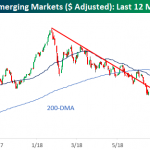Following an eventful week in financial markets, this week’s Commitments of Traders report shows quite a few significant changes. Firstly, net long positions in the euro and the British pound are no longer at bullish extremes. Secondly, open interest in most currencies and commodities (except the yen) has fallen substantially. Following intense volatility, traders are more hesitant to maintain large net positions. Crude oil remains at a bullish extreme, despite the fact that there are 41,845 fewer net long contracts this week.
The purpose of this weekly report is to track how the consensus is positioned across various currencies and commodities. When net long positions become crowded in either direction, we flag extended positioning as a risk. Crowded positions do not suggest an imminent reversal, but should be considered as a significant risk factor when investing in the same direction as the crowd. This is shown below:
CFTC COT speculator positions (futures & options combined) – February 13, 2018

Source: CFTC, MarketsNow
Notable extremes, significant changes in weekly positions, and large net positions as a proportion of open interest are highlighted above. Extremes in net positions are highlighted when speculator positioning is more than two standard deviations above trailing 1-year and 3-year averages. Weekly changes are highlighted when they are significant as a proportion of open interest. Finally, net positions as a proportion of outstanding interest are highlighted when they are large relative to historical averages.
The biggest changes in net positions this week includes falling net positions in the British pound, Canadian dollar and the Australian dollar. Net positions in GBP are sharply lower following concerns that Brexit negotiations remain contentious. Earlier this week, we wrote that comments from Michel Barnier are likely to dampen enthusiasm for pound sterling. Commodity currencies (such as AUD and CAD) have been relatively weak as concerns grow regarding the economic health of commodity exporting countries. Australia and Canada both suffer from very high consumer debt, reliance on commodity demand from emerging markets, and significant housing bubbles.














Leave A Comment